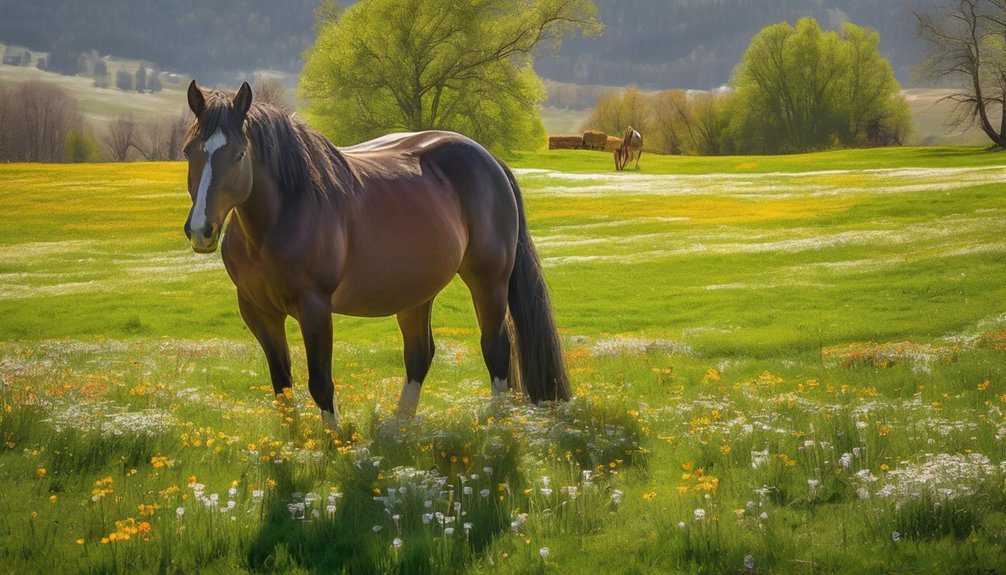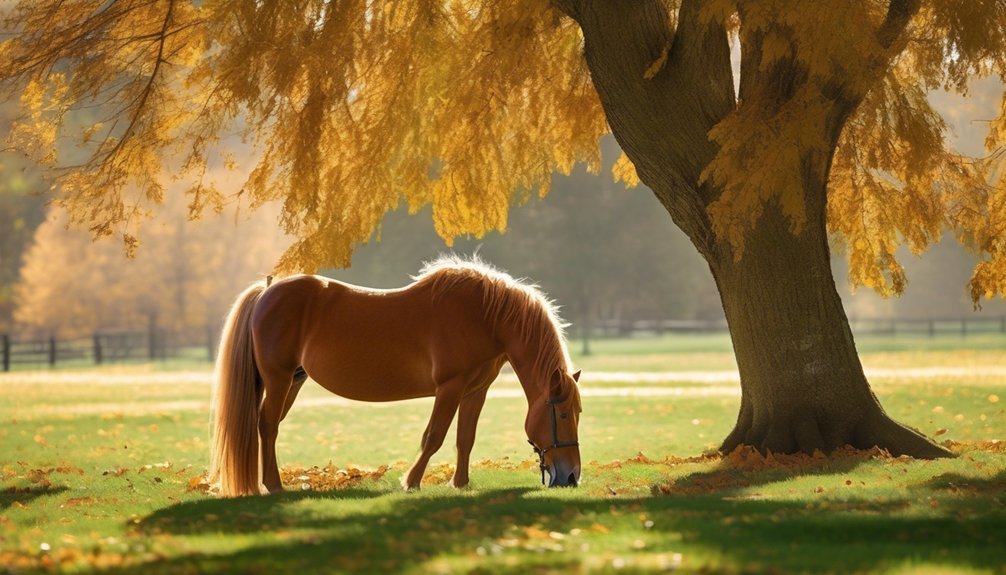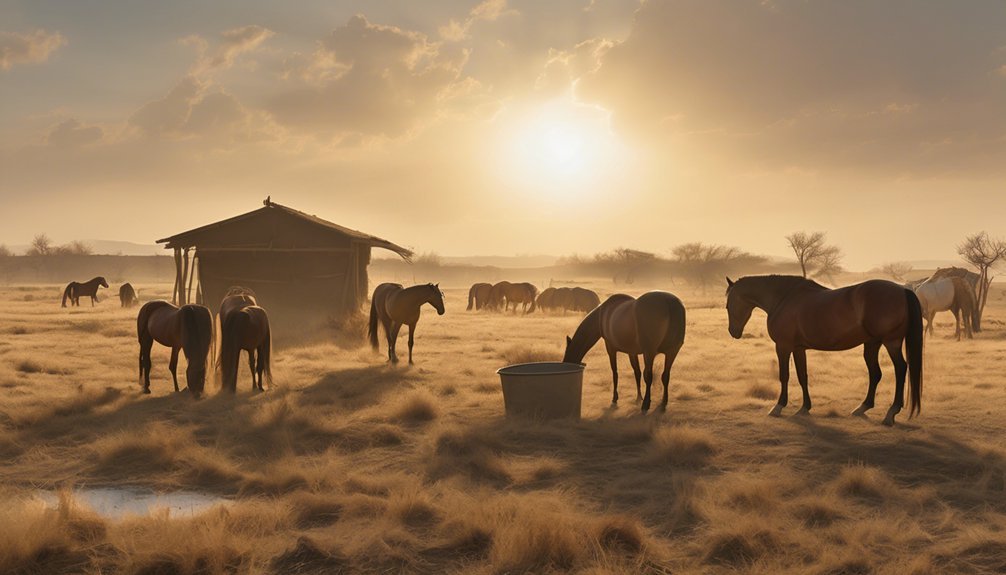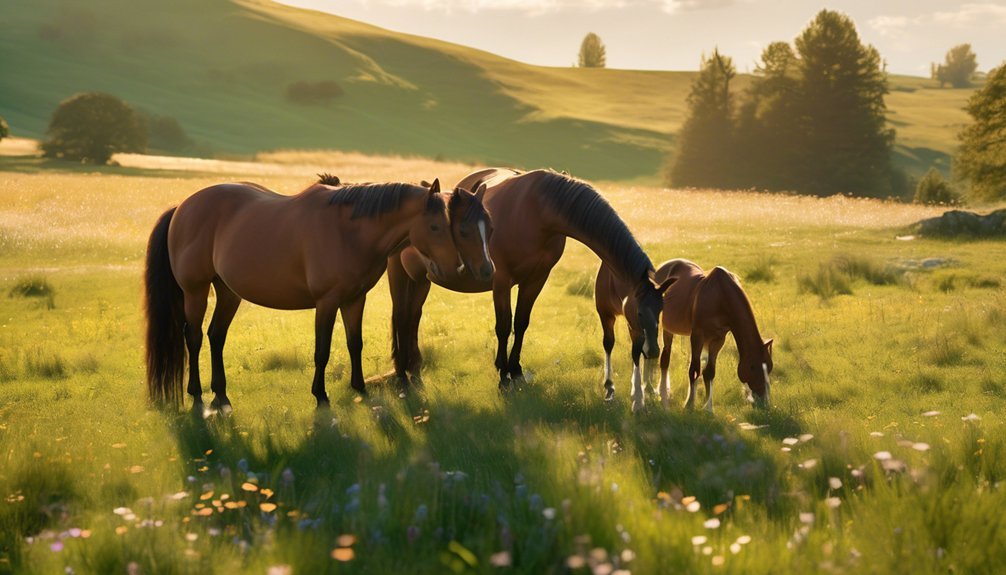
Like a well-orchestrated symphony, your horse's diet must harmonize with the changing seasons. Each season brings distinct challenges and opportunities that can greatly influence your horse's nutritional needs. In spring, lush pastures may tempt you to relax your feeding strategy, but doing so could overlook critical adjustments. Similarly, summer heat and fall preparations require careful planning to ensure optimal health. What specific changes should you consider to keep your horse thriving throughout the year?
Key Takeaways
- Seasonal forage quality impacts nutrient availability, with spring providing rich vitamins and minerals compared to summer's potential nutrient dilution.
- In winter, increase caloric intake and provide high-fiber forage to combat heat loss and support horse warmth.
- Adjust dietary plans in spring to incorporate fresh pasture while regularly monitoring its quality for optimal nutrition.
- During summer, prioritize hydration and consider adding electrolytes to the diet after intense physical activity to prevent dehydration.
- Fall is crucial for preparing winter nutrition by optimizing hay storage and inspecting for mold to ensure quality feed throughout colder months.
Understanding Your Horse's Nutritional Needs

When you consider your horse's health, understanding its nutritional needs is crucial, especially as seasons change.
The quality of forage plays a vital role in nutrient absorption, impacting your horse's overall well-being. As grass growth fluctuates with the seasons, you need to evaluate the forage's nutritional value.
In spring, lush pastures may provide abundant vitamins and minerals, while summer can lead to nutrient dilution due to drought. Conversely, fall may introduce richer, denser forage, but it can also bring about changes in fiber content.
Winter Diet Adjustments for Energy and Warmth
As temperatures drop and winter sets in, adjusting your horse's diet becomes essential to maintain their energy levels and warmth.
To ensure your horse thrives during these colder months, focus on the following adjustments:
- Increase caloric intake to combat heat loss.
- Enhance forage quality by providing high-fiber options like hay or alfalfa.
- Consider adding energy-dense feeds, such as oats or beet pulp.
- Monitor water intake, ensuring access to fresh, unfrozen water.
These changes help your horse generate the necessary body heat while staying active.
Remember, a well-balanced winter diet not only supports their warmth but also their overall health.
Paying attention to these dietary needs will keep your bond strong and your horse feeling its best.
Spring Nutritional Considerations for Transition

With winter's chill behind you, it's time to rethink your horse's nutritional plan for spring. As temperatures rise, your horse will benefit from fresh spring forage. This transition requires careful pasture management to ensure optimal nutrient availability. Regularly monitor pasture quality and adjust your horse's diet accordingly.
Here's a simple guide to help you navigate this seasonal shift:
| Nutrient | Importance | Sources |
|---|---|---|
| Protein | Supports muscle repair and growth | Legumes, grains |
| Fiber | Aids digestion and gut health | Grass, hay |
| Vitamins | Essential for immune function and overall health | Fresh forage, supplements |
| Minerals | Important for bone health and metabolic functions | Salt blocks, minerals |
| Water | Crucial for hydration and nutrient absorption | Clean, fresh supply |
Summer Hydration and Feed Requirements
During the summer months, maintaining your horse's hydration and adjusting their feed requirements becomes crucial, especially as heat and humidity can significantly impact their overall health and performance.
Implementing effective hydration strategies is vital not just for replenishing fluids but also for maintaining electrolyte balance.
Consider these tips to keep your horse thriving:
- Offer fresh, clean water at all times.
- Add electrolytes to their feed or water, especially after intense workouts.
- Monitor their sweat loss during rides and adjust feeding accordingly.
- Provide ample shade and rest periods to prevent overheating.
Fall Preparations for Winter Nutrition

Preparing your horse's diet for the upcoming winter months is essential, especially as temperatures drop and forage quality changes. As you transition into fall, focus on optimizing hay storage to maintain its nutritional value. Inspect your hay for mold or spoilage, and store it in a dry, cool area.
| Storage Method | Benefits |
|---|---|
| Covered Outdoor | Protects from rain |
| Indoor Barn | Keeps consistent temp |
| Silage Bags | Preserves moisture |
| Net Wrap Bales | Minimizes waste |
Additionally, consider supplementing your horse's diet with high-quality forage or grain as needed. This preparation will ensure your horse stays healthy and comfortable during the colder months ahead.
Monitoring Your Horse's Condition Year-Round
As seasons shift, keeping a close eye on your horse's condition becomes crucial for its overall health and performance.
Year-round monitoring helps you catch any changes in body condition early, allowing for timely adjustments to diet and care.
Here are some key aspects to focus on:
- Weight Management: Regularly assess your horse's weight to prevent obesity or underweight issues.
- Muscle Tone: Look for signs of muscle loss or gain, adjusting exercise accordingly.
- Coat Quality: A shiny, healthy coat indicates proper nutrition and care.
- Behavior Changes: Note any shifts in energy levels or temperament, which can signal dietary needs.
Frequently Asked Questions
How Do Seasonal Changes Affect Hay Quality and Availability?
Seasonal changes impact hay quality and availability significantly. As temperatures fluctuate, forage availability decreases, influencing hay nutritional value. You'll need to monitor these factors closely to ensure your horse receives optimal nutrition throughout the year.
Should I Change My Horse's Feeding Schedule With the Seasons?
Did you know that horses may need 10-20% more feed during colder months? You should definitely consider seasonal adjustments in feeding frequency, ensuring your horse gets optimal nutrition throughout changing weather conditions for their health and well-being.
Are There Specific Supplements Needed During Seasonal Transitions?
During seasonal transitions, you should consider nutrient adjustments for your horse. Seasonal supplements can help support their health by addressing specific deficiencies, ensuring they maintain energy levels and overall well-being throughout the changing environment.
How Does Seasonal Weather Affect My Horse's Appetite?
When temperatures drop, your horse's appetite might wane, like a garden wilting without sun. As seasons shift, you'll notice appetite fluctuations, directly influenced by temperature effects; keep an eye on their feeding habits during transitions.
Can My Horse's Breed Influence Dietary Needs During Seasons?
Yes, your horse's breed characteristics significantly influence its nutrient requirements during seasonal changes. Different breeds may need tailored diets to maintain optimal health, energy levels, and performance, especially as environmental conditions shift throughout the year.
Conclusion
In summary, adapting your horse's diet to seasonal changes is crucial for their health and performance. Did you know that horses can consume up to 2% of their body weight in forage daily? This statistic highlights the importance of adjusting their intake based on seasonal forage availability. By closely monitoring your horse's nutritional needs throughout the year, you ensure they stay healthy, energized, and ready to thrive, no matter the season.





